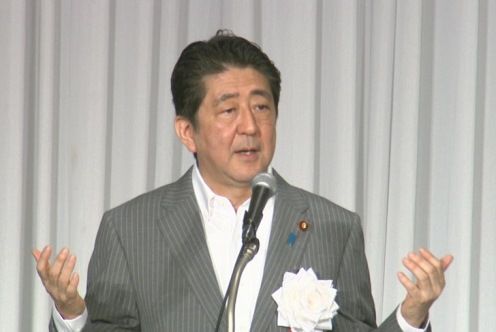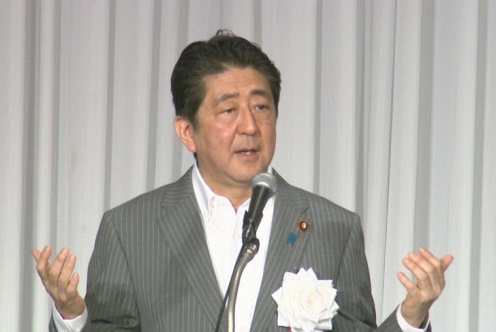Home > News > The Prime Minister in Action > June 2016 > General Meeting of the Japan Association of City Mayors
The Prime Minister in Action
General Meeting of the Japan Association of City Mayors
June 8, 2016
[Provisional Translation]
Prime Minister Shinzo Abe attended the 86th General Meeting of the Japan Association of City Mayors held in Tokyo.
The Prime Minister said in his congratulatory address,
“Good morning, everyone. I am Shinzo Abe, Prime Minister of Japan. I would like to make a few remarks on the occasion of the 86th General Meeting of the Japan Association of City Mayors.
Since we are now facing the House of Councillors election in the near future, and city mayors from all over Japan have gathered here today, I am tempted to make a great speech. However, I will refrain from doing so and confine myself to my prepared remarks.
I would like to once again express my sincere respect to all of the city mayors for making arduous efforts every day at the front lines of local government to develop their communities and further improve the welfare of their residents.
First, I would like to again express my condolences for those who lost their lives in the earthquakes in the Kumamoto region, and my heartfelt sympathies for all affected by the disaster.
In response to this disaster, local governments from all over the country, especially from cities, have been providing powerful support for the recovery and reconstruction of the affected areas, such as by dispatching more than 1,400 staff members to the affected areas.
As well as expressing my respect for these wonderful measures, which transcend local government boundaries, I would like to request the continued implementation of these support measures.
Six weeks have now passed since the earthquakes. Last Saturday, I visited the affected areas in Kumamoto and Oita. Moving into temporary housing has begun, and measures toward recovery and reconstruction are advancing. As well as fully utilizing the established supplementary budget to provide detailed and robust support to facilitate the rebuilding of livelihoods and the reconstruction of industry as soon as possible, we will keep careful watch over the fiscal situations of municipalities, and thoroughly offer all needed support.
As many already know, and as President Mori also mentioned, at the Ise-Shima Summit held recently, the G7 members agreed to coordinate on the release of the three arrows of monetary policy, fiscal policy, and structural policy. This means that Abenomics will truly be developed globally.
As the country holding the G7 Presidency, Japan will take the lead to mobilize all manner of policies, to once again set the engine of Abenomics at full speed ahead.
To this end, this autumn we plan to carry out comprehensive and bold economic measures. We will carry out structural reform, and stimulate private-sector investment that will create future growth. In addition, we have decided to postpone the increase in the consumption tax by 30 months to October 2019.
However, we will not lower the flag of fiscal rehabilitation. There is no change in the basic policy that there can be no fiscal soundness without economic revitalization. I plan on firmly maintaining our goal to achieve fiscal soundness by FY2020.
Advancement of regional vitalization, which has now entered the second stage, is one of the important policies of Abenomics.
Almost all municipalities have established regional versions of the comprehensive strategy, and so we are now at the stage of beginning all-out project development. Unless the regions become energized, Japan’s future will not open up. I am convinced that it is only when the regions become energized that Japan’s future will bloom. The government will support the ambitious initiatives of the regions in the three aspects of information, human resources, and finances, and will accelerate regional vitalization.
In regard to decentralization reform, last year we established regional versions of Hello Work and enabled the use by the regions of the national Hello Work system. Also, we carefully considered each of the numerous proposals that we received from the regions, and were able to respond to more than 70 percent of them.
However, there is no end to this reform. This year, we will continue to strongly advance decentralization reform based on regional ideas, maintaining the fundamental stance of listening carefully to the views of the regions.
The benefits of Abenomics are steadily spreading to every part of Japan. The ratio of job offers to job seekers has achieved the highest level in 24 years. Some may hold the view that this is only true in certain major cities, but that is definitely not the case.
The ratio of job offers to job seekers has reached more than 1.0 in all 47 prefectures.
We have created a situation whereby, for every job-seeker, there is at least one job available, in all 47 prefectures. This is a historical first. We have been able to realize this milestone, which has never been achieved before, even during Japan’s period of rapid economic growth or the bubble economy era.
We will squarely face the issue of an aging society and declining birthrate, and transform Japan into a country that can grow. We will also carry out measures to implement the fourth industrial revolution, which fully utilizes IoT and artificial intelligence.
By realizing the goals of achieving the largest GDP in postwar history of 600 trillion yen, realizing the desired birthrate of 1.8 children per woman, and reducing the number of people who leave employment to provide nursing care to zero, we will build an even stronger positive cycle of growth and distribution.
In the Plan to Realize the Dynamic Engagement of All Citizens, we have formulated a roadmap that fixes its gaze on ten years into the future, and we will steadily advance this roadmap to realize a society in which all one hundred million-plus citizens are each dynamically engaged.
In that process, it is essential to resolve each issue that is faced by each region according to its own particular features.
I strongly hope that all city mayors, who are truly taking the lead in their respective communities, will freely express their abilities.
I am resolved that the government will combine its strengths with regional initiatives to absolutely create a Japan in which each region shines, and so that everyone who lives in the regions, and their children, can have dreams and hopes centered on their individual regions.
As a result of the economic policies that we have advanced in the last three and a half years, the total national and regional tax revenues combined have increased by 21 trillion yen. Of this, the amount of revenue increase resulting from lifting the consumption tax from 5% to 8% is eight trillion yen, while the remaining 13 trillion yen comprises the benefits of the economic policies that we have advanced. We will absolutely make use of these benefits for regional vitalization as well as to reduce the number of people who leave employment to provide nursing care to zero, and to achieve the desired birthrate of 1.8 children per woman. By doing so, as well as building a stable social foundation, we will be able to grow more. We will invest to achieve greater growth, and conduct further distribution through the results of that growth. This is precisely the positive cycle of growth and distribution that we are aiming for. By thoroughly and strongly implementing this positive cycle, we will both further stabilize a social basis that provides peace of mind, and realize economic growth. I am resolved that we will realize a Japan where each and every person can experience an abundant life, no matter the region where they live.
Sharing this resolve with all gathered here today, I would like to end my remarks with the promise that I will advance regional vitalization whereby regions can freely flourish to their full potential.
Let us continue to work hard together. Thank you very much.”


